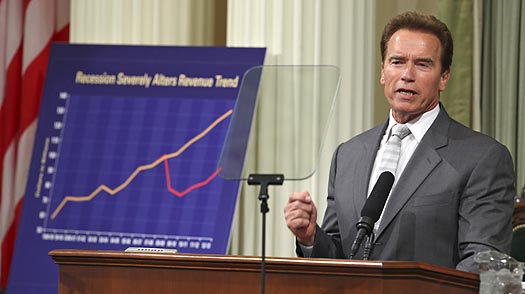Sign up for a free subscription to Phil’s Stock World Report, click here!
After California: Which States Are in the Most Peril?
Courtesy of TIME, written by Barbara Kiviat
 California is the poster child for dysfunctional state finance. A week past the legal deadline for passing a budget, the state has yet to close a $26 billion hole. State workers are — yet again — being told to stay home. The National Park Service is threatening to take back parks it gave to California should the state try to save money by closing them. Taxpayers are getting IOUs in the mail instead of refund checks since there’s no cash to pay them what they’re owed. You can now buy the IOUs on eBay.
California is the poster child for dysfunctional state finance. A week past the legal deadline for passing a budget, the state has yet to close a $26 billion hole. State workers are — yet again — being told to stay home. The National Park Service is threatening to take back parks it gave to California should the state try to save money by closing them. Taxpayers are getting IOUs in the mail instead of refund checks since there’s no cash to pay them what they’re owed. You can now buy the IOUs on eBay.
California’s crazy budget laws make it an extreme case, but that doesn’t mean it’s alone in financial duress — there are plenty of other states in serious hot water. (See how Americans are spending now.)
All but a handful of states with fiscal years ending on June 30 have taken wrenching steps needed to pass new budgets: mainly, a raft of tax hikes and service cuts. Vermont is shutting down highway rest stops and decimating its Agency of Natural Resources. In Washington, 40,000 people are losing their state-subsidized health care, and public-college tuition could be going up as much as 14%. New Jersey is hiking taxes on high-income earners, cigarette smokers (an extra 12.5 cents a pack) and drinkers (a 25% increase on wine and liquor).
And there could be plenty more pain ahead. Revenues — from income, sales and property taxes — continue to fall. True, states have already plowed through a lot of tough decisions to close the $102 billion shortfall they collectively faced during the last budget cycle. But already it looks like this year’s gap will be $121 billion, according to a report from the National Conference of State Legislatures.
Two of the worst-off states by that count are Alaska and Nevada. Each of them will need to spend 30% more than what state tax officers think they’ll be collecting. And neither has a state income tax, relying on oil and tourism taxes, respectively, for most of their revenues.
 In other states, however, it’s the extra volatility that comes from dependence on personal-income tax that is exacerbating the problem. Research by economists at the Chicago Fed show that by the late 1990s, the personal-income tax had emerged as the major source of state revenue — and that personal-income tax swings more wildly than other taxes, like sales tax. The typical state now gets 36% of its funding from personal-income tax, according to the Rockefeller Institute of Government. As unemployment continues to climb and investors offset their capital gains with losses, the effect is felt disproportionately at many statehouses. (See 10 ways your job will change.)
In other states, however, it’s the extra volatility that comes from dependence on personal-income tax that is exacerbating the problem. Research by economists at the Chicago Fed show that by the late 1990s, the personal-income tax had emerged as the major source of state revenue — and that personal-income tax swings more wildly than other taxes, like sales tax. The typical state now gets 36% of its funding from personal-income tax, according to the Rockefeller Institute of Government. As unemployment continues to climb and investors offset their capital gains with losses, the effect is felt disproportionately at many statehouses. (See 10 ways your job will change.)
And then there are the long-term obligations — those big, hulking costs that, much as society may value them, eventually weigh on states’ financial health. In New York, unfunded state pension liabilities average $2,633 per person. Massachusetts’ tab is even larger, at $3,372 per capita, although that’s nothing compared to New Jersey’s $9,833. By comparison, California seems in something of a sweet spot, at $1,325. Still, that’s hefty compared to Florida’s $9.
"Looking long-term, places like New York and Massachusetts could have some pressure, even though they are relatively highly rated and have passed budgets for this year," says John Miller, chief investment officer of Nuveen Asset Management, which runs, among other things, municipal-bond funds. "Those are areas where obligations are probably growing faster than their revenues." That spend-now-pay-later attitude eventually catches up with a state. Ask California. (Read "Can the U.S. Afford to Let California Fail?")
How quickly other states may hit the wall will largely depend on how quickly we exit this recession. Will we emerge later this year? Not until next? It is easy to find an economist for whatever answer you’d like. That’s not nefarious; it’s just really hard to anticipate what the economy is going to do. For the fiscal year that just ended, revenues came in below expectations in 38 states, according to the National Association of State Budget Officers and the National Governors Association. And if projections are too rosy again in the just-signed state budgets? Well, then we’ll have even more shortfalls to come. "What we’re doing is waiting," says Craig Brandon, a municipal-bond portfolio manager at Eaton Vance. "The thing you’re going to start seeing over the rest of the summer is whether tax revenues are coming in where states are projecting them to be." Fingers crossed. IOUs ready.
Photos: 1) Governor Arnold Schwarzenegger speaks about the budget crisis at a joint legislative session in Sacramento, Calif. 2) By Steven Gottlieb / Getty. Courtesy of TIME.


